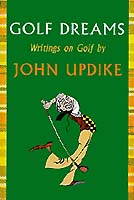|
By Jim Tang
Golf Dreams is the gripping real-life drama of two African American teenagers from inner-city Chicago whose athletic abilities earn them scholarships to a suburban prep school, where all kinds of—
No, wait. For a moment there I thought I'd died and gone to HoopWeb.
Golf Dreams is a collection of golf-related writings—essays mostly, along with several short stories and excerpts from novels—by the popular and critically-acclaimed John Updike.
Starting at the beginning (or, perhaps, before the beginning, depending on your point of view), the dust jacket notes say of the author that
"few have written as sympathetically, as knowingly, about the peculiar charms of bad golf, and the satisfactions of an essentially losing struggle."
While this is no doubt true, it seriously shortchanges Updike's achievement.
Certainly a fair amount of Golf Dreams is devoted to documenting the obsessive golfer's pendulum swing from optimism through pessimism to masochism, and back, and forth, ad infinitum.
Were he to stop there, however, his golf writing would be little more than the literary equivalent of one of those Tim Conway or Leslie Nielsen videos. More finely observed, to be sure, and enlivened by an
audacious sense of humor which often startles with its simultaneous concision and crudeness.
More cerebral and less slapstick—but substantively indistinguishable.
Fortunately for us, Updike's golf writing is redeemed by the simple fact that he lives in the real world. Or if not exactly in the real world, then at least in a well-maintained suburb right on the outskirts of the real world; close enough to know that his relatively privileged life is just that—a privileged life.
A refreshing class-consciousness informs his prose, occasionally rising to the surface to great effect.
Look, for instance, at the beginning of "Moral Exercise," which we are excerpting on GolfWeb.
Or at "Golf as a Game of the People," an uproariously funny paean to (and lament for) public golf courses, which begins: "No other game (lest it be polo) is as thoroughly associated with capitalism and its oppression as golf."
While Updike's awareness of golf's sociopolitical dimension never threatens to make him reject the game outright, it clearly does prevent him from committing the fatal error of equating golf with life and life with golf.
This is most apparent, of all places, in a review of Michael Murphy's Golf in the Kingdom, entitled "Is There Life After Golf?"
Of Shivas Irons, the Scots guru-cum-golf pro given to such mystical utterances as "Let the nothingness into yer shots" and "The greatest breakthrough is taking forever," whose encounter with the narrator has a life-altering effect, Updike writes:
And yet Updike insists that the pleasures of the "artificial haven" remain, and remain vital.
Chief among them is the joy that accrues to ordered human contact, to ritual friendship, as "The Camaraderie of Golf" makes clear:
Writing like this should make Golf Dreams a must-read for the avid golfer. As for the more casual (or even non-) player of the game, well...
A few months ago, during a corporate get-together, I had the good fortune to play golf (for the first time in my life) with a rather remarkable group of co-workers, including our Chief Golf Evangelist, Grant Spaeth. For three hours or so, as our team played a nine-hole scramble, all the strange talk about the "nobility" of golf, the "good will" and "mutual solicitude" and so forth,
seemed to make perfect sense.
To my amazement, I was happy there.
While I may be constitutionally incapable of viewing "golf camaraderie" without at least some suspicion, I've come to believe that, with the right people,
under the right conditions, golf can facilitate the expression of our better selves.
Yes, it may be rooted in artifice and role-playing. But it's a start.
When I want to remind myself of that, I will pick up this book. |
